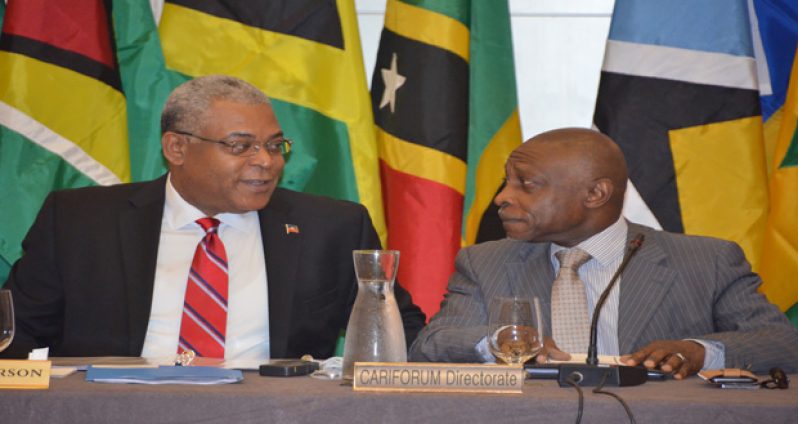-
Guyana comforted by EU’s assurance of dialogue
GUYANA’S Third Vice President and Foreign Affairs Minister, Carl Greenidge said the European Union’s implementation of its External Strategy for Effective Taxation was of major concern. “We are very concerned at the European Union implementation of its External Strategy for Effective Taxation as Part of its Anti-Tax Avoidance Package,” the Foreign Affairs Minister said.
He was at the time addressing the Twenty-Third Meeting of the Caribbean Forum of African, Caribbean and Pacific States (CARIFORUM) at the Marriott Hotel on Thursday in the presence of the Secretary-General, Ambassador Irwin LaRocque and Chief of Cabinet of the President of Haiti Jean Max Bellerive.

The Anti-Tax Avoidance Package forms part of the Commission’s ambitious agenda to foster fairer, simpler and more effective corporate taxation in the EU. The Package contains concrete measures to prevent aggressive tax planning, boost tax transparency and create a level playing field for all businesses in the EU.
However, Minister Greenidge told the Council of Ministers that though Guyana was concerned, it was comforted by the EU’s assurance of dialogue and consultation, maintaining that the country stands ready to maintain the region’s high standards and commitment in this process.
Pointing out that the EU is a valued development partner of the Caribbean, Minister Greenidge explained that the Caribbean-EU Joint Partnership Strategy, which concluded in 2014, seeks to deepen CARIFORUM-EU Dialogue and structure the bi-regional cooperation to respond to the existing and developing challenges and opportunities.
The guiding principles of the strategy, he said, were joint ownership, mutual accountability, solidarity, co-management and co-responsibility in the areas of Regional Integration and Cooperation; Reconstruction of Haiti,; Climate Change and Natural Disasters; Crime and Security; and Joint Action in Bi-regional and Multi-lateral Fora and on Global Issues.
“Implementation of the strategy is a shared responsibility between CARIFORM and the EU. In fact, the strategy was the basis for CARIFORUM proposals for the 11th European Development Fund (EDF) Caribbean Regional Indicative Programme (CRIP) which was signed last June,” Minister Greenidge further explained.
He said the 11th EDF CRIP was valued at €346M of development financing resources for the period 2015-2020, during which emphasis will be placed on Haiti.
The agreement makes financial provisions for Regional Economic Cooperation and Integration (€102.0M); Climate Change, Disaster Management, Environment and Sustainable Energy (€61.5M); Crime and Security (€44.0M); Caribbean Investment Facility (€135.0M); and Technical Cooperation Facility (€3.5M).
Zooming in on CARIFORUM’s current political status, the Foreign Affairs Minister told the Council of Ministers that Member States continue to pursue inclusive human, social and economic development in an environment characterized by the region’s tradition of sound democracies, stable political environments and solid human rights and governance practices.
“The political environment continues to be characterized by free and fair elections, peaceful retention or changes in government and recourse to the judicial system to resolve related problems,” he explained.
However, he posited that the implementation of development initiatives in CARIFORUM was often challenged by the region’s vulnerabilities and exposure to external factors such as climate change; financial, economic and other measures taken by developed countries; and insecurity occasioned by transnational crime, trade in illicit drugs and small arms.
But he said: “CARIFORUM States have resorted to a number of political, economic and social initiatives. The prospects for the future include continued observance of democratic traditions, deepening of regional political level cooperation, and deepening of involvement in hemispheric arrangements.”
In alluding to the €346M, which is being provided under the 11th EDF CRIP, the CARIFORUM Secretary-General said it helps to foster economic growth and sustainable development even as it simultaneously addresses regional economic integration cooperation, climate change, disaster management and sustainable energy and crime and security.
Programmes and Projects designed must have a positive impact on the ground in Member States, he implored the Council of Ministers.
“Take stock of where we are with respect to the implementation of the CARIFORUM EU Economic Partnership Agreement,” Ambassador LaRocque said as he further implored the Council.
The Meeting also focused on the implementation and programming of the 10th and 11th European Development Fund (EDF) Caribbean Regional Indicative Programme (CRIP), the implementation of the CARIFORUM-EU Economic Partnership Agreement (EPA), the Future of the ACP — including the Eighth ACP Summit of ACP Heads of State and Government, scheduled for May 31 – June1, 2016 in Port Moresby, Papua New Guinea — and future ACP-EU Relations in the post-Cotonou period.
The meeting focused on recent EU developments on financial services and received reports from the two CARIFORUM institutions, the Caribbean Export Development Agency and the Caribbean Regional Information and Translation Institute.
CARIFORUM refers to the Caribbean Forum of ACP Group of States which are signatories of the Georgetown Agreement. This Agreement was signed in 1975, and it created the African, Caribbean and Pacific Group of States (ACP) which is made up of 79 African, Caribbean and Pacific states.
All Participating States in CARIFORUM, with the exception of Cuba, are signatories to the ACP-EU Partnership Agreement or “Cotonou Agreement” and the EPA, respectively.
The CARIFORUM Members are: Antigua and Barbuda, The Bahamas, Barbados, Belize, Cuba, Dominica, Dominican Republic, Grenada, Guyana, Haiti, Jamaica, St. Kitts and Nevis, Saint Lucia, St. Vincent and the Grenadines, Suriname and Trinidad and Tobago.



.jpg)








